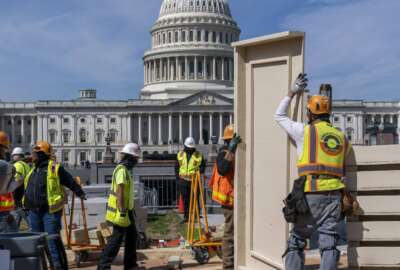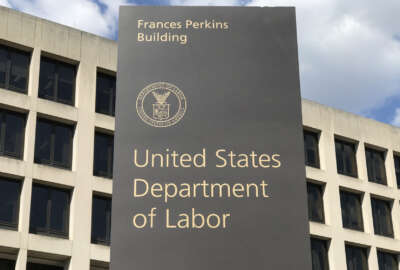There they go again: Labor proposes overtime for salaried contractor employees
The Labor Department has revived an old idea: Salaried private-sector employees who work overtime. Well, you can't just compensate them with pizza. A rule proposed...
The Labor Department has revived an old idea: Salaried private-sector employees who work overtime. Well, you can’t just compensate them with pizza. A rule proposed last week would mandate overtime for people making up to $55,000 a year. The current ceiling is $35,000. Federal Drive with Tom Temin spoke to someone with the federal-contractor view of the rule: Executive Vice President for Policy at the Professional Service Council, Stephanie Kostro.
Interview Transcript:
Tom Temin And Stephanie, I’m guessing probably that you guys don’t feel like this is the best rule ever proposed.
Stephanie Kostro Well, thanks, Tom, so much for having me. We go back to the old adage, everything old is new again. This Department of Labor proposed rule on overtime protection really does hearken back to an Obama era attempt to do something similar back then towards the end of President Obama’s tenure. There was an attempt to double the ceiling for the amount by which the workers could be compensated. At that point, it was $23,000 a year, the threshold, and they were trying to make it into the forties. This, as you mentioned, is about $20,000 additional to where it is today, $55,000 is the threshold. And contractors are worried about this. It’s not that they are against overtime, that’s not the point at all. Workers should be compensated for the work that they do in more than just pizza. That said, when contracts are negotiated between the federal government and the private sector, they are tied into specific labor rates. And PSC, as you know, attracts government services contractors. And the backbone of our industry is making sure that we have a highly skilled, knowledgeable and dedicated workforce. So we do want to compensate them adequately, but we are tied to whatever is allowable in the contract for labor rates. This proposed rule doesn’t contemplate what impact this will have on government contractors, so you can be sure that PSC will be commenting.
Tom Temin Yes. It affects any private sector employer. It’s common, right, for a contractor or a company to say, you know what, this software project, this integration project we got to deliver this Wednesday under the contract. But we have work that’ll take us till Thursday, all hands on, we’re going to get this done no matter how long it takes. Now, those people, a lot of them would be getting overtime if this goes through.
Stephanie Kostro That’s exactly right. And when you’re working on a fixed price contract, for example, you don’t have a lot of leeway as a company to compensate the employees out of the existing pool of funds that was negotiated during the contract. And so you are taking it therefore out of overhead or you’re taking it out of other elements of your business. Again, services contractors really do want to compensate their workers adequately, and again, in more than just pizza and beer. That said, we’ll be going back to the Department of Labor with some considerations for them about how this will impact government contractors. And at the end of the day, the capabilities that the government receives in what happens on that front.
Tom Temin Even in cost plus contracts, that government could challenge costs. What’s the old poster you used to see? Lack of planning on your part doesn’t constitute an emergency on my part. You’re overtime is your problem. You said you deliver it then this is what your rates and the costs are that you quoted. They could challenge a company and say, Well, these overtime costs are not allowable costs.
Stephanie Kostro That’s exactly right. And I think at the end of the day, this has to be an iterative conversation between contracting officers and the contractors themselves to talk about what impact this particular overtime protections role will have on contractors and the work that they perform. I do know that the government would like to see a robust industrial base to support the government missions that are performed. That said, there has to be a conversation about this particular rule as there was years ago when this came up before. I will note that this rule was challenged in court and a federal judge did rule that the Department of Labor exceeded its authority. So we will be watching also the court system closely.
Tom Temin Yeah, interesting. They were knocked down once, but they’re back again. It’s like remember those toys we had as a kid, a clown punching bag. They pop up again. Wait a minute, I thought I had the knockout blow there. We’re speaking with Stephanie Kostro. She is executive vice president for policy at the Professional Services Council. And then OASIS, here we are at the midnight hour for OASIS. And now there are amendments to the RFP and no extension on modifying what’s going on.
Stephanie Kostro There are concerns within the government contract community about OASIS+, and that is to say there were at least two amendments that have come out. One in early July and one in mid August that fundamentally would have changed some companies approaches to their proposals. And more recently, [General Services Administration (GSA)] released answers to some questions that were posed, and those were released on Aug. 29, so just last week. The due date for proposals is Sept.13. But some of the answers that GSA provided and some of the requirements in the new amendments really do change contractors approaches, whether it’s teaming arrangements, etc.. One piece, and I’d like to talk more to the government counterparts about this, is that teaming arrangements do take weeks, if not months, to negotiate. And if you change the rules of the game this close to the end of the solicitation period, you might have to compromise on the due diligence. You want to get a new partner on your proposal. You do need to scrub their financials, you need to scrub what they bring to the table, etc.. Lawyers are involved, a lot of legal paperwork, and I just don’t think with releasing Q&A this close to the due date the GSA is doing anyone any favors in terms of having to renegotiate those agreements.
Tom Temin Yes, the answers and all of this were released on Aug. 29. The Q&A that you have to fill out. And then the proposal deadline is still Sept.13, for those that want to bid on OASIS, which has been delayed by protests for quite a while here.
Stephanie Kostro Well, there have been changes when the court system ruled on other vehicles, they had to see how those rulings might apply to OASIS+. So this has been going on for quite a while in development. That said, PSC does take seriously some of the changes that have come down the pike recently and has asked GSA to consider extending the due date for one more month until Oct. 13, which is a Friday next month. Our members would love more time, but to keep it as close to on track as possible. We’ve asked for a 30 day extension.
Tom Temin All right. In the meantime, the Senate is back in town. Next week the House comes back to town. And here we go with the budget talks. And we know the ramifications of what’s happening and what’s not happening. But if there is a budget, it’s assuming a rate of inflation that is way below reality and that’s got contractors concerned.
Stephanie Kostro DC based parlor game of what will Congress do in September, I’m not one to put any bets on the table. I would say one area that we are tracking very, very closely is we know that the president’s budget, when it came across from the White House earlier this year, had a 2.4% inflation rate built in. Unfortunately, our country still hasn’t recovered from the higher than expected inflation of last year, it did trickle over into this year. And if you just look at, we look at various indices, but one that we take very seriously is the personal consumption expenditure and the six month trimmed PCE price index, that comes out of the Department of Commerce and excluding food and energy, which are known to be volatile. That number for July was 4.2%. So again, that’s a significant departure from the 2.4% that was included in the president’s budget. So as we look forward to seeing what the Hill is considering for FY 24. We really need to unpack. If you’re keeping the budget, the funding levels a certain level, what are you giving up because of inflation? And I want to make sure that we are not cutting into muscle, that it is really just fat we are trimming should it be found, but that we’re not eating into what exactly the American people require of their government.
Tom Temin And now if your cost accountants work overtime to figure all of that out, then you have to pay them overtime. So it kind of feeds on itself, doesn’t it?
Stephanie Kostro There is that piece of it. I would note the unexpected part of what happened this year is, we had the debt limit crisis and we had this fiscal responsibility act of 2023 come out. And it really does impact what the Hill is discussing for the FY 24 appropriations bills. It really remains to be seen what impact that Fiscal Responsibility Act will have on any of this conversation.
Copyright © 2025 Federal News Network. All rights reserved. This website is not intended for users located within the European Economic Area.
Tom Temin is host of the Federal Drive and has been providing insight on federal technology and management issues for more than 30 years.
Follow @tteminWFED





